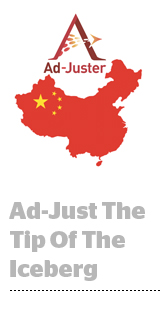
The Chinese ad tech acquisition drumbeat continues.
On Wednesday, Shanghai-based private equity firm Innotech bought data aggregator and discrepancy management company Ad-Juster.
Terms of the deal were not disclosed, but industry sources told AdExchanger the sale was well within the eight-figure range.
Even at the potential high end, that doesn’t touch the astonishing deal prices of other recent ad tech acquisitions by Chinese buyers, including $1.4 billion for app marketing startup AppLovin and $900 million for contextual ad network Media.net.
The real story, however, isn’t around enormous exits – it’s about the budding maturity of the digital advertising ecosystem in China, said Peter Yang, Ad-Juster’s co-founder and VP of product development.
“The market appears to be expanding, and that gives smaller players in the space an opportunity to help drive innovation,” Yang said.
Although the duo is still in the process of hammering out their go-to-market strategy for China, the macro plan is for Ad-Juster, whose clients include Pandora, LinkedIn, NBC, CBS Radio and Univision, to take advantage of Innotech’s existing relationships to expand into China and APAC.
But Innotech will also invest in growing Ad-Juster in the US and potentially other markets down the line. Data reconciliation is a headache and an imperative, regardless of the geo, Yang said.
“Publishers, and increasingly the buy side, are dealing with the problem of having to pull reporting metrics from multiple different sources,” he said. “It’s a prevalent problem globally.”
Fragmentation is Ad-Juster’s bread and butter.
The company provides discrepancy reconciliation management by connecting local ad servers and platforms to third-party partners for mobile, video, viewability and, increasingly, inconsistencies from header-bidding implementation.
But viewability in particular has been plagued by discrepancies between vendors. As China starts to develop its own viewability standards – the Mobile Marketing Association in China recently created a working group to do just that – reconciliation will become a growing need.
The China market seems to be tracking where the US market was with viewability about three years ago, but at an accelerated pace.
“When viewability came out in the US market, people spent about a year just talking and trying to figure out what it meant for them,” Yang said. “China is learning from what’s happening in the US market.”
Ad-Juster is gearing up to meet that growth opportunity, both in China and in other international markets, with growth of its own. The company, which has raised no outside funding since it was founded in 2007, added six employees in January, bringing its total headcount to 30.
Although China has proven to be fertile ground for ad tech exits – in addition to AppLovin and Media.net, see the acquisitions of mobile SSP Smaato and app monetization company NativeX – the trend doesn’t extend to players with a commoditized offering.
As Luma Partners CEO Terry Kawaja previously observed to AdExchanger, “If you’re a me-too company in terms of how you make money, that wouldn’t be attractive to Chinese buyers.”
This post was syndicated from Ad Exchanger.

More Stories
L’Oréal partners with WPP for influencer growth
Warner Bros. Discovery CEO David Zaslav Receives $51.9 Million Pay Package for 2024
TikTok Fave Duolingo Boosts YouTube Shorts Viewership 430% in One Year